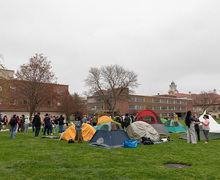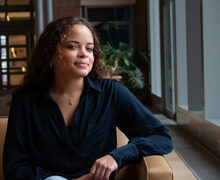Marvin Druger’s 90th birthday celebrates an ‘immeasurable’ legacy at SU
Maxine Brackbill | Photo Editor
Marvin Druger spends his 90th birthday in the atrium of the Heroy Geology Building at Syracuse University. His friends and family came to watch the festivities, live music, grand speeches and the cake cutting featuring Druger's face.
Get the latest Syracuse news delivered right to your inbox.
Subscribe to our newsletter here.
Dressed in a Burger King crown and a “Hugh Hefner” robe, Syracuse University professor emeritus Marvin Druger received his birthday party guests Sunday in the Heroy Geology Building’s atrium. Sitting on an office chair “throne” with a line of people waiting to speak with him, he celebrated his 90th birthday with current and former members of the SU community.
“(Druger) has touched so many people’s lives and made an impact on so many people,” said Amy Dygert, who worked with Druger when she was a student. “It will be amazing to come together and celebrate him and let him see how many people he’s impacted.”
Dygert said Druger is known for his “larger-than-life personality” and is as iconic to the SU community as Otto the Orange. Druger taught BIO 121 and 123 for 47 years and, after retiring from SU in 2008, he “unretired” by continuing to give campus tours, writing for 55 Plus Magazine, publishing poetry books and teaching over 40,000 elementary, university and adult Syracuse students. Beloved by students and faculty over his tenure, the event was an opportunity for around 100 community members to celebrate him.
One of Druger’s many “Marvinisms,” or mottos he lives by, is that 10 out of 10 people die. This is the main reason he’s “unretired” at 90 — he wants to do more before he has to do less. He is particularly proud of the beautiful life he’s had, teaching tens of thousands of students and living 60 years with his wife, Patricia Meyers Druger, who died in 2014.
“I’ve accumulated all this information, knowledge and experiences, which I’d love to pass on to people,” Druger said. “I try to do it in my writings, but eventually, it’s going to end. It’s closer to the end than it is to the beginning.”
Druger’s health has declined, and he had to sit for most of his party. When he returns to SU to give historical tours, a graduate student pushes him around in a transport chair. However, he said he enjoys the experience of sitting in one spot and talking about the little things he loves.
About 15 years ago, Druger had an emergency surgery because of a sudden twist in his colon. Then, 10 years later, he started having gastrointestinal symptoms. Coincidentally, one of Druger’s former students, Dr. David Nesbitt, was sure it was scar tissue from the first surgery. Nesbitt was right.
Nesbitt said that he saved Druger, but also killed him. Despite being years removed from the surgery, it’s an operation he is still recovering from today.
“I tell everybody that my insides are a mess. They told me it looks like a jigsaw puzzle,” Druger said. “Everything’s connected to the wrong thing. And I really survive on my mouth, my mind and my money. And my son, who’s an ophthalmologist, says, ‘mostly your mouth.’”
With the New York Times’ obituaries filled with people who died in their 60s and 70s, Druger said he avoids reading that section of the paper. It makes him ask himself, “What the hell am I doing here at 90?”
However, he said his long life is an opportunity to make an impact on as many people as he can, continuing with radio shows and writing. With Chancellor Kent Syverud in attendance, Druger is still devoted to SU.
The two posed with a cardboard cutout of Druger for photographers. While Druger worked at the university, Syverud said he was the university’s “nexus,” exemplifying the importance of celebrating him over a decade after his retirement.
“Every time I saw him, he always had something to tell me we should make better at the university,” Syverud said. “The first thing was the benches between Newhouse and Schine because they were on angles so people slid off the ends and we had to level the benches for Marvin.”

Maxine Brackbill | Photo Editor
Druger poses for a photo with a cardboard cutout of himself. The party included many past inside jokes made by his former students, colleagues and himself throughout the years he taught at Syracuse University.
Kay Fiset, a former SU summer session administrator, remembers long conversations with Druger in which he’d tell her tales about anything and everything. Druger’s birthday party was the first time she was back on campus for 13 years.
She said, like many others, Druger always made people laugh. She feels fortunate to have worked with him closely.
“It’s very funny when you know somebody pretty well, you know that they’re celebrated, but you don’t think about (it) when you’re talking to them,” Fiset said.
What sets Druger apart is his desire to be more engaging and encourage motivational learning. Peeking out of his Smith Hall window, he would do “Druger Drops,” which included him throwing answer keys to his tests after students had taken them. He used to even leave his phone open for calls the night before a test to iron out any issues students had while studying.
“You’ll remember the experience. You won’t remember the information. What kids remember from my class is not the mitochondria, they remember I throw answer keys out the window,” Druger said. “Then, everybody says, ‘Well, this guy’s a joker. He’s an entertainer. It’s not really teaching them anything.’”
Because of his approach, many faculty members would criticize Druger’s teaching style, but he insists that he never diluted the content. The importance of finding what makes each student unique is much more important, he said.
“I sort of think of it like grains of sand on the beach is billions of grains of sand,” Druger said. “You say ‘That’s not very important because there are so many of them,’ but every grain of sand is different, and so that makes that grain of sand, special and important”
After going to a private high school, Marcie Swirnow was used to knowing her teachers well. Druger made an effort to understand his students despite the large lecture, she said. He even checked in on his students during their lab periods and asked her to be a part of a Newsweek article about him — which she accepted.
His engaging style has influenced students from his years of teaching and has even been the catalyst for career changes. Swirnow is one such example. Despite graduating with a broadcast and digital journalism degree from Newhouse School of Public Communications, Druger ignited her passion for science with his introductory biology course. From there, she took more classes to go to graduate school for physical therapy.
“My whole career trajectory changed after his class,” Swirnow said. “I had no interest in physical therapy or anything in the science field whatsoever. I was there for Newhouse. I went from Newhouse to being a physical therapist.”
Outside of the classroom, Druger was part of several different organizations that spread science to the public. Dygert was part of a National Science Foundation Grant program in which Druger was the primary investigator. The grant focused on supporting STEM classrooms in the Syracuse City School District by working with SU students.

Maxine Brackbill | Photo Editor
Around the Heroy Geology Building atrium, plaques and frames of Druger’s achievements and articles are displayed for attendees to admire.
Dygert met her now-husband while working on the grant. Whether Druger knows it or not, the Dygert family credits him for their relationship and two sons. Druger would always joke about the couple, too. When they had to go to Washington, D.C. for a grant report, Druger would say the couple could share a hotel room and decrease the cost of the trip.
“We met on that grant and so Marv always would joke that the best thing to come out of that grant was our family because that was almost 20 years ago,” Dygert said. “We started dating, we got married and we’ve got two little boys now.”
Former students and others close to Druger, including Swirnow and Dygert, sent in testimonials as a present for his birthday. In a letter to Druger, Jeremy Mariani, who graduated from SU in 2013 with a degree in psychology, said he remembers the “Druger Drop” and Frontiers of Science lectures fondly. Mariani was one of the last students to take one of his courses at SU.
Druger’s legacy is “immeasurable,” Mariani said. He said Druger’s energy — even in his last semesters — made the class engaging.
“I think it’s fitting for someone of his stature, someone a mentor to so many people, so many students,” Mariani said. “So many researchers that I know have come out of the university, and I’ve learned so much from him.”
His birthday party reflected 90 years of life that impacted thousands of people like Mariani. The Heroy Geology Building was filled with Druger’s accomplishments at SU, along with many books and publications he was featured in. Throughout the party, Druger joked with his guests and requested an encore from Otto Tunes, who sang “Happy Birthday” after he cut his cake’s first slice.
Looking back, he urges others to live life how they want.
“Be there. Don’t miss it. If you miss it, nobody can tell you what you missed,” Druger said. “We learn from everything that we do, and everything that we do becomes part of what we are.”
Published on April 11, 2024 at 12:05 am
Contact Rosina: [email protected]





